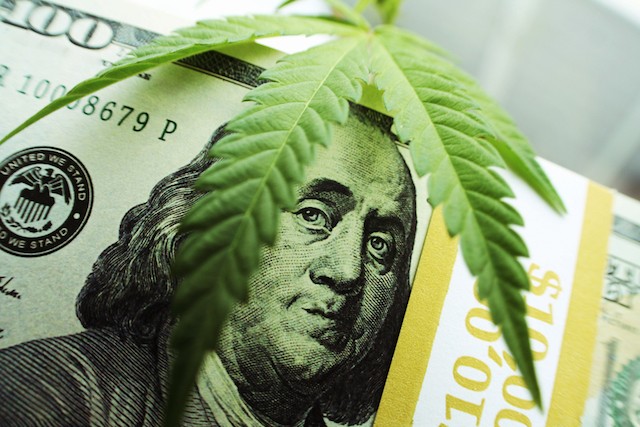Press Secretary Sean Spicer sent shock waves through the cannabis industry at today’s White House news briefing, implying that the Department of Justice will increase enforcement of federal laws against adult-use marijuana.
“There’s a big difference between [medical] and recreational marijuana,” Spicer told reporters. “I think when you see something like the opioid addiction crisis blossoming in so many states around this country, the last thing that we should be doing is encouraging people…There is still a federal law that we need to abide by…So, I think there’s a big difference between medical marijuana, in the states where it’s allowed in accordance with the appropriations rider…versus recreational marijuana. That’s a very, very different subject.”
Industry response to Spicer’s surprising statements (and unsubstantiated claims connecting recreational use and opioid addiction) was strong and swift, citing economic opportunity, the will of the voters and President Trump’s earlier indications that he would not impinge on states’ rights. National Cannabis Industry Association executive director Aaron Smith issued the following statement:
“It would be a mistake for the Department of Justice to overthrow the will of the voters and state governments who have created carefully regulated adult-use marijuana programs. It would represent a rejection of the values of economic growth, limited government, and respect for federalism that Republicans claim to embrace.
“These programs are working. Marijuana interdictions at the Mexican border are down substantially, youth use has not increased in states with legal access to cannabis, and responsible cannabis businesses are contributing tens of thousands of jobs and hundreds of millions of dollars in economic impact to their communities.
“The American people overwhelmingly support this approach. National polls show that 60% of Americans believe that marijuana should be legal for adult use. Furthermore, 71% of Americans – including majorities in both parties and every age group – oppose the federal government cracking down on these voter-supported programs.
“It was especially disappointing to hear Press Secretary Spicer refer to the opioid crisis in relation to marijuana. Science has discredited the idea that marijuana serves as any kind of gateway drug, and the addiction and death rates associated with opioids simply do not occur in any way with cannabis. In fact, scientific research increasingly shows that access to cannabis significantly decreases rates of opioid addiction and death.
“As a candidate, President Trump said on many occasions that he believed marijuana policy – both medical and adult-use – should be left to the states. When asked if he would allow his Attorney General to shut down adult-use programs like Colorado’s, he said, ‘I wouldn’t do it – no…I think it should be up to the states, absolutely.’
“Voters agree, and that should guide the administration’s policy.”
Cannabis Business Alliance Executive director Mark Malone brought up similar arguments, again using Colorado as a shining example, in his statement below:
“The legal cannabis industry takes power and money out of the hands of drug cartels and puts funds into state coffers and has the real potential to help offset the Federal Government’s budget shortfalls. The legal cannabis industry provides safety procedures and regulations that protect our youth, and states where cannabis is legal have seen a reduction of teen use. In fact, a recent study found that opioid use decreases in states that legalize marijuana. Dialing back any level of legalization of marijuana would be extremely misguided and would turn back the enormous positive progress that has occurred over the last several years. Going after the legal marijuana industry would be a direct affront to the overwhelming numbers of Americans who have voted time after time to approve legal cannabis. It would also be an affront to the Cole Memo and a misuse of energy and taxpayer funds. The Cannabis industry is compliant, a job creator, and tax engine bringing state budgets out of the red and into the black. Republicans have core values that include belief in state rights and a free market. The same voters that have elected the current Administration continue to overwhelmingly support cannabis, as was evident in this fall’s Elections. President Trump has said that this is a State issue so we expect him to be true to his word and continue to let States regulate cannabis.
“Colorado, the first U.S. state to legalize cannabis for adult-use, reported selling $1.3 billion in marijuana and marijuana-related products in 2016, with a projected $3 billion economic impact for 2016. Additionally, Colorado’s 2016 tax revenues from marijuana sales were about $199 million in tax and fees revenue for the calendar year. These taxes fund projects including school construction, public health and law enforcement. Throughout the country, cannabis prohibition continued to be rolled back, with more states legalizing marijuana in 2016. Earlier in 2016, Ohio and Pennsylvania legalized medical marijuana, and Illinois decriminalized the plant. November’s election results found four states voting positively to approve cannabis for adult-use (California, Maine, Massachusetts and Nevada), and four states voting to allow Medical Marijuana use (Florida, Arkansas, North Dakota and Montana). These new additions mean 29 states plus the District of Columbia now offer some category of legal cannabis, and one in five Americans soon will have access to legal marijuana.
“Cannabis continues to offer a positive medicinal option for patients including veterans suffering from PTSD and children with debilitating conditions such as epilepsy and spastic quadriplegic cerebral palsy. A recent report from the Colorado Department of Public Health and Environment found that marijuana consumption by Colorado high school students has dipped since the state first permitted recreational Cannabis use by adults. The biannual poll also showed the percentage of high school students consuming Cannabis is smaller than the national average among teens. Colorado has experienced a significant economic boost since the legalization of Cannabis, accounting for sizeable job growth and tax income for Colorado.”
When asked to elaborate on whether his comments meant that the federal government was planning to take action against recreational marijuana in adult-use states, Spicer referred reporters to the Department of Justice. The DoJ, through a spokesperson, also declined to elaborate, leaving the industry with even more of that too-familiar feeling of uncertainty.










